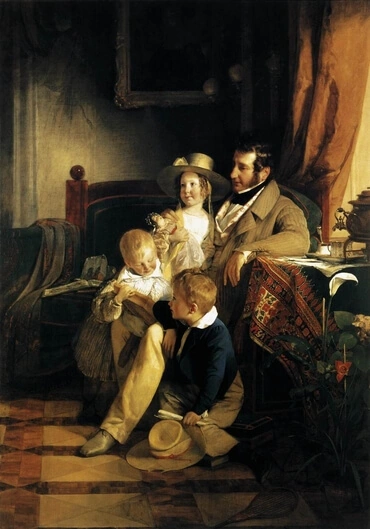1
Estas son las generaciones de los hijos de Noé: Sem, Cam y Jafet, a los cuales nacieron hijos después del diluvio.
2
Los hijos de Jafet: Gomer, y Magog, y Madai, y Javán, y Tubal, y Mesec, y Tiras.
3
Y los hijos de Gomer: Askenaz, y Rifat, y Togarma.
4
Y los hijos de Javán: Elisa, y Tarsis, Quitim, y Dodanim.
5
Por éstos fueron partidas las islas de los gentiles en sus tierras, cada cual según su lengua, conforme a sus familias en sus naciones.
6
Los hijos de Cam: Cus, y Mizraim, y Fut, y Canaán.
7
Y los hijos de Cus: Seba, Havila, y Sabta, y Raama, y Sabteca. Y los hijos de Raama: Seba y Dedán.
8
Y Cus engendró a Nimrod. Este comenzó a ser poderoso en la tierra.
9
Este fue poderoso cazador delante del SEÑOR; por lo cual se dice: Así como Nimrod poderoso cazador delante del SEÑOR.
10
Y fue la cabecera de su reino Babel, y Erec, y Acad, y Calne, en la tierra de Sinar.
11
De esta tierra salió Assur, el cual edificó a Nínive, y a Rehobot, y a Cala,
12
Y a Resén entre Nínive y Cala; la cual es la ciudad grande.
13
Y Mizraim engendró a Ludim, y a Anamim, y a Lehabim, y a Naftuhim,
14
Y a Patrusim, y a Casluhim de donde salieron los filisteos, y a Caftorim.
15
Y Canaán engendró a Sidón, su primogénito y a Het,
16
y a Jebusi, y a Amorri, y a Gergesi,
17
y a Hevi, y a Arci, y a Sini,
18
y a Aradi, y a Samari, y a Amati; y después se derramaron las familias de los cananeos.
19
Y fue el término de los cananeos desde Sidón, viniendo a Gerar hasta Gaza, hasta entrar en Sodoma y Gomorra, Adma, y Zeboim hasta Lasa.
20
Estos son los hijos de Cam por sus familias, por sus lenguas, en sus tierras, en sus naciones.
21
También le nacieron hijos a Sem, padre de todos los hijos de Heber, y hermano mayor de Jafet.
22
Y los hijos de Sem: Elam, y Asur, y Arfaxad, y Lud, y Aram.
23
Y los hijos de Aram: Uz, y Hul, y Geter, y Mas.
24
Y Arfaxad engendró a Sala, y Sala engendró a Heber.
25
Y a Heber nacieron dos hijos: el nombre del uno fue Peleg, porque en sus días fue partida la tierra; y el nombre de su hermano, Joctán.
26
Y Joctán engendró a Almodad, y a Selef, y Hazar-mavet, y a Jera,
27
y a Adoram, y a Uzal, y a Dicla,
28
y a Obal, y a Abimael, y a Seba,
29
y a Ofir, y a Havila, y a Jobab: todos éstos fueron hijos de Joctán.
30
Y fue su habitación desde Mesa viniendo de Sefar, monte de oriente.
31
Estos fueron los hijos de Sem por sus familias, por sus lenguas, en sus tierras, en sus naciones.
32
Estas son las familias de Noé por su descendencia, en sus naciones; y de éstas, fueron divididos los gentiles en la tierra después del diluvio.







